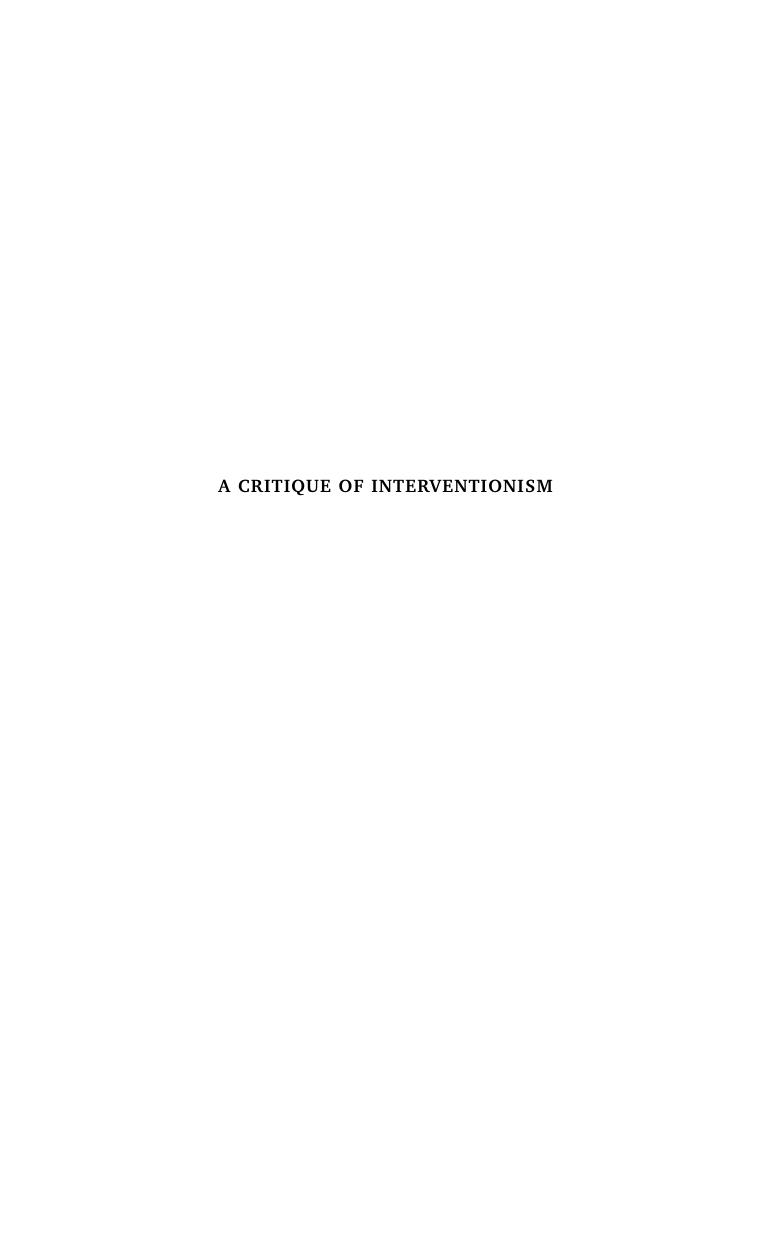A Critique of Interventionism by Ludwig von Mises

Author:Ludwig von Mises [Ludwig von Mises]
Language: eng
Format: epub, pdf
ISBN: 978-1-61016-272-2
Publisher: Ludwig von Mises Institute
Published: 2011-11-06T16:00:00+00:00
7 THE CONCEPT AND CRISIS OF SOCIAL POLICY
All the economic policies of the last two generations are designed step by step to abolish private property in the means of production—if not in name, then in substance—and to replace the capitalist social order with a socialistic order. Decades ago Sidney Webb announced it in his Fabian Essays.49 As the pictures of the desired future social order varied with the individual branches of socialism, so did their opinions on the road by which the goal was to be reached. There are questions on which all branches could agree. In other questions great differences separated the camps, as, for instance, factory labor by married women, or protection of handcrafts from the competition of big business. But they all agreed on the rejection of the social ideal of liberalism. No matter how they differed from each other, they joined ranks in the fight against “Manchesterism.” In this point, at least, the champion Socialists of the Chair saw eye to eye with the champions of social liberalism.
For the movement toward a gradual replacement of capitalism by a socialistic or syndicalistic social order, the term “social policy” slowly gained acceptance. A precise definition of the term was never offered, as sharp conceptual definitions were never the concern of the Historical School. The use of the term “social policy” remained ambiguous. Only in recent years when pressed by economic critique did the social politicians attempt to define the term.
Sombart probably recognized the nature of social policy most clearly. “By social policy,” he wrote in 1897, “we understand those measures of economic policy that effect the preservation, promotion, or repression of certain economic systems.”50 Amonn rightly found many faults with this definition, but especially pointed out that measures should be characterized by their objectives, not by their effects within the framework of policy, and that social policy goes beyond the realm that usually is called “economic policy.”51 But it is decisive that Sombart saw a change in the economic order as the objective of social policy. Let us bear in mind that when he wrote this, Sombart was standing firmly on Marxian ground, which made him think of the introduction of socialism as the only conceivable social policy. We must admit that he correctly perceived the essential point. The only deficiency of his definition is his inclusion of all efforts toward a realization of the liberal program, efforts that were made at a time when, in the language of Marx, the bourgeoisie was still a revolutionary class. Similarly, Sombart expressly included the liberation of peasants from feudal servitude as an example of social policy. Many writers followed him in this respect. Again and again they sought to define the term “social policy” in such a way that it would include political measures other than those aiming at the realization of socialism.52
It makes little sense to deal further with the empty argument on the concept of social policy, an argument that just recently caught fire. It was touched off
Download
A Critique of Interventionism by Ludwig von Mises.pdf
This site does not store any files on its server. We only index and link to content provided by other sites. Please contact the content providers to delete copyright contents if any and email us, we'll remove relevant links or contents immediately.
International Integration of the Brazilian Economy by Elias C. Grivoyannis(109948)
The Radium Girls by Kate Moore(12017)
Turbulence by E. J. Noyes(8040)
Nudge - Improving Decisions about Health, Wealth, and Happiness by Thaler Sunstein(7690)
The Black Swan by Nassim Nicholas Taleb(7106)
Rich Dad Poor Dad by Robert T. Kiyosaki(6607)
Pioneering Portfolio Management by David F. Swensen(6288)
Man-made Catastrophes and Risk Information Concealment by Dmitry Chernov & Didier Sornette(6004)
Zero to One by Peter Thiel(5786)
Secrecy World by Jake Bernstein(4740)
Millionaire: The Philanderer, Gambler, and Duelist Who Invented Modern Finance by Janet Gleeson(4465)
The Age of Surveillance Capitalism by Shoshana Zuboff(4275)
Skin in the Game by Nassim Nicholas Taleb(4237)
The Money Culture by Michael Lewis(4198)
Bullshit Jobs by David Graeber(4179)
Skin in the Game: Hidden Asymmetries in Daily Life by Nassim Nicholas Taleb(3989)
The Dhandho Investor by Mohnish Pabrai(3758)
The Wisdom of Finance by Mihir Desai(3731)
Blockchain Basics by Daniel Drescher(3574)
